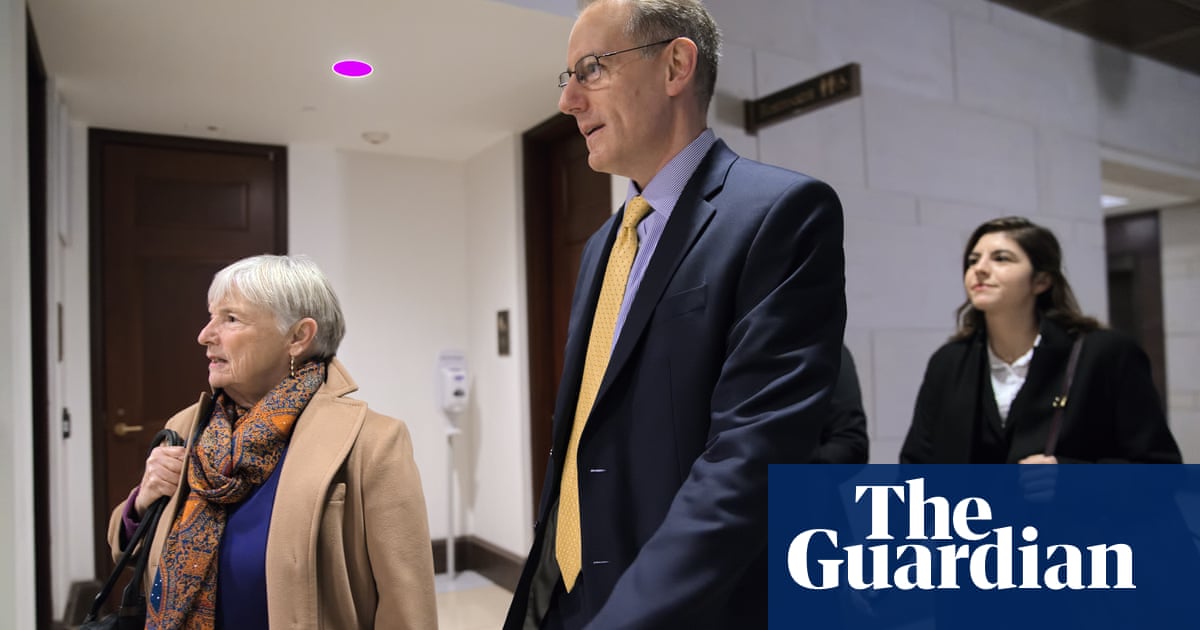A lawyer for the White House’s budget office resigned partly because of concerns over Donald Trump’s freeze on military aid to Ukraine, a longtime career official from the office has testified to Congress behind closed doors.
Mark Sandy of the Office of Management and Budget (OMB) told the House of Representatives’ impeachment inquiry that an individual in the office’s legal division quit in part over issues with the suspension of security assistance to Ukraine, according to a transcript of his deposition released on Tuesday.
Sandy also testified that another unnamed official at the OMB also resigned. “Yes, this individual did express frustrations,” he said. “He expressed some frustrations about not understanding the reason for the hold.”
In a further sign of pushback, the Pentagon also raised concerns, Sandy added.
Trump is facing impeachment for allegedly using nearly $400m in military aid to bribe Ukraine to launch two investigations for his political benefit. This month’s dramatic public hearings by the House intelligence committee will be followed by one at the House judiciary committee next week.
“Are you aware of any individual in the legal division resigning or leaving OMB … at least in part because of Ukraine security assistance,” Sandy was asked.
“Oh. Yes, I am,” he replied. “This person expressed concerns to me about actions vis-a-vis the Impoundment Control Act” – a reference to 1974 legislation that forbids the withholding of congressionally-approved aid.
A committee member followed up: “In the context of Ukraine security assistance and the hold.”
“Yes,” answered Sandy, adding that although he did not wish to attribute this as the sole reason for the person’s actions, he was “aware of their frustrations in that area”.
The exchange was revealed as the House committees leading the fast-paced inquiry released the remaining transcripts from the closed-door depositions that took place earlier this month, which Republicans have sought to condemn as a “show trial”, even though they were participants in the closed-door hearings.
Sandy also recalled that he was told on 19 June the US president had raised questions about the military aid to Ukraine after reading a media report. He was then informed in an email on 12 July that Trump himself “is directing a hold on military support funding for Ukraine” but given no explanation or justification.
When Sandy raised concerns that the aid suspension may be illegal, his authority was revoked and given to a political appointee, he continued. The OMB began the official process of suspending assistance to Ukraine on 25 July – the day of Trump’s now infamous phone call with Ukraine’s, president Volodymyr Zelenskiy, which discussed investigations of the 2016 election and former vice-president Joe Biden.
Only when the security assistance was unfrozen in September was Sandy given a reason: that Trump had concerns other countries were not paying their fair share in aid compared to America. Democrats argue this was a rationalisation conjured up after the fact in order to conceal the true political motivation.
Meanwhile Philip Reeker, the diplomat in charge of US policy for Europe, told the inquiry that there was an an “understanding” that Rudy Giuliani, Trump’s personal lawyer, was feeding the president a lot of “negative information” about Ukraine. Giuliani has been widely condemned for running an irregular diplomatic channel that undermined the work of state department veterans.
Reeker said Marie Yovanovitch, the ambassador to Ukraine, had been ousted following “outrageous smears” but the state department declined to issue a statement of support. Mike Pompeo, the secretary of state, has recently dodged questions on the topic.
Adam Schiff, chairman of the House intelligence committee, and the other committee chairs involved in the initial inquiry stage, Eliot Engel and Carolyn B Maloney, said in a joint statement: “The testimonies from Ambassador Reeker and Mr Sandy continue to paint a portrait of handpicked political appointees corrupting the official levers of US government power, including by withholding taxpayer funded military assistance to Ukraine, to further the president’s own personal political agenda.”

